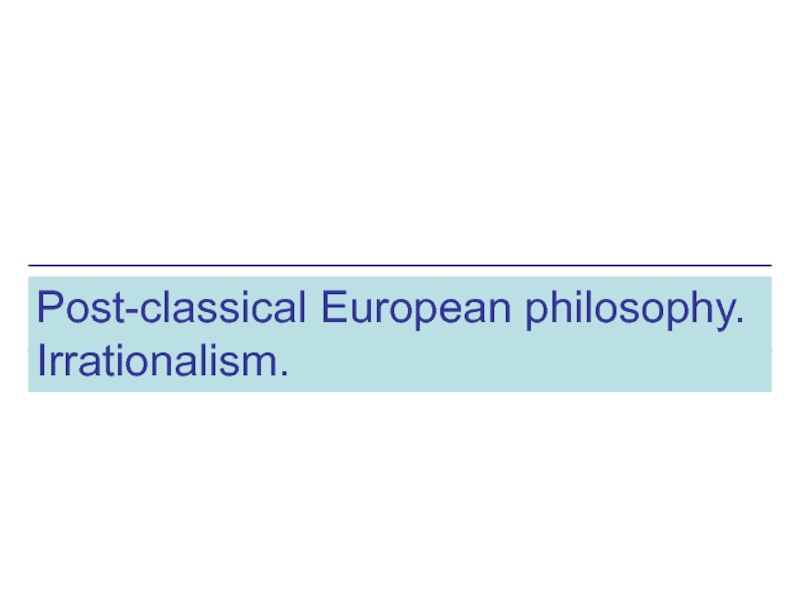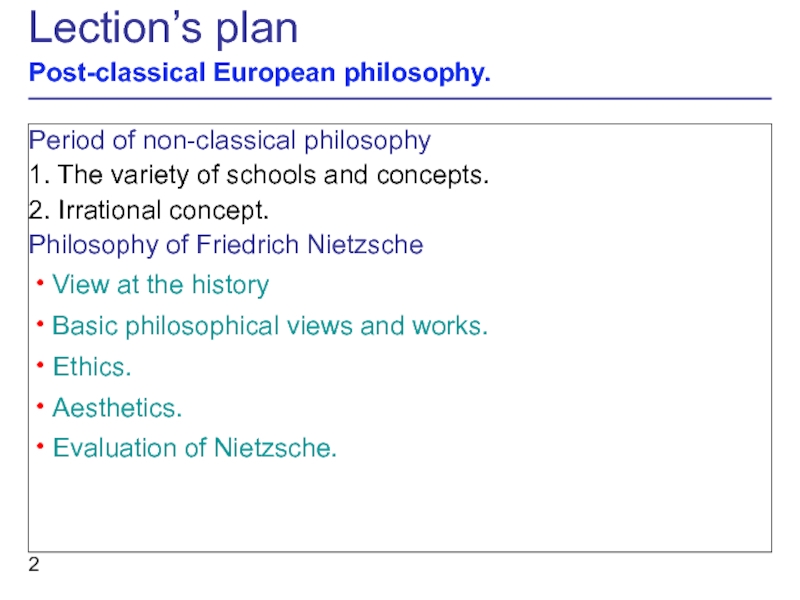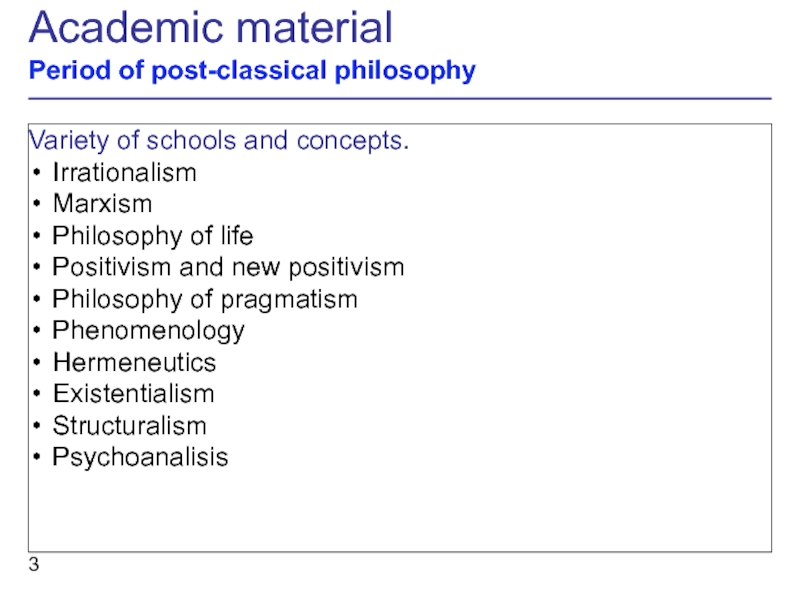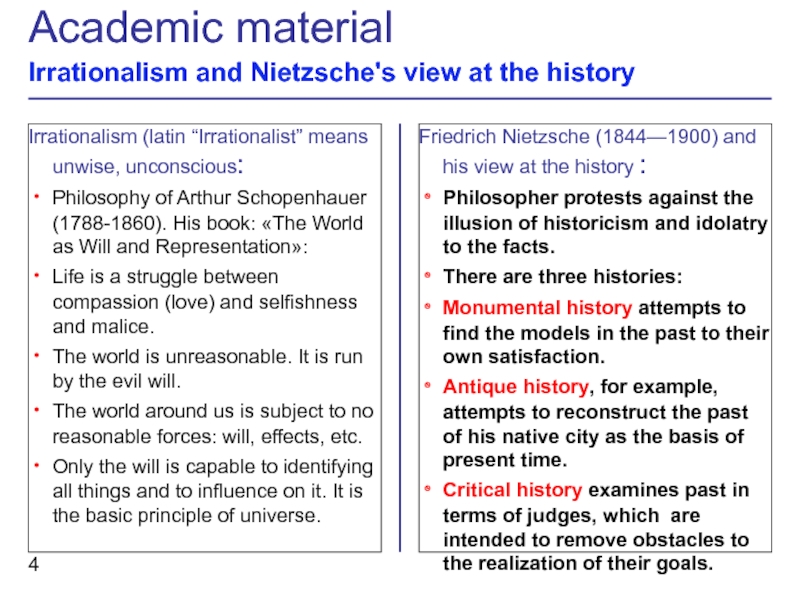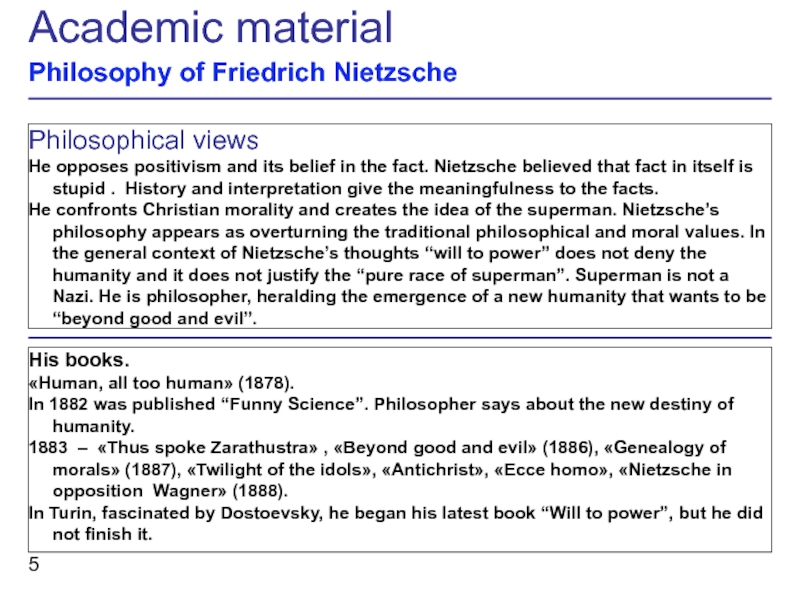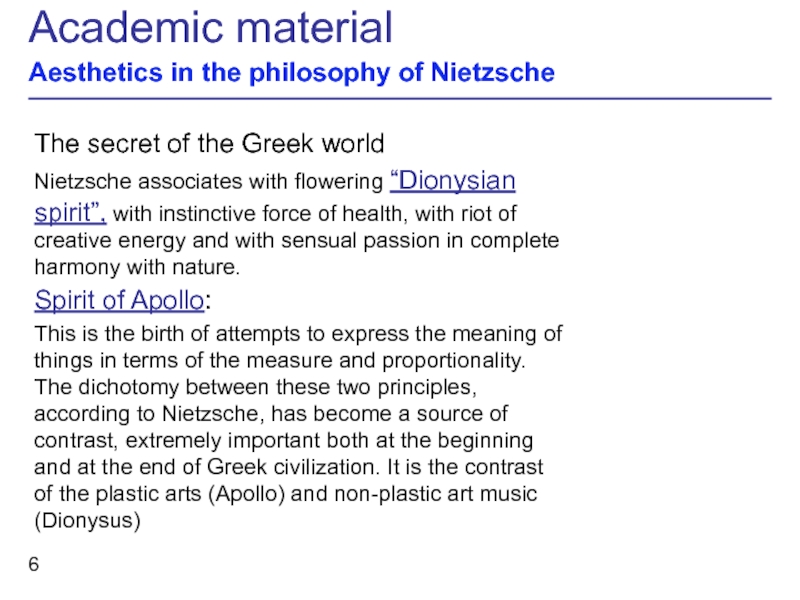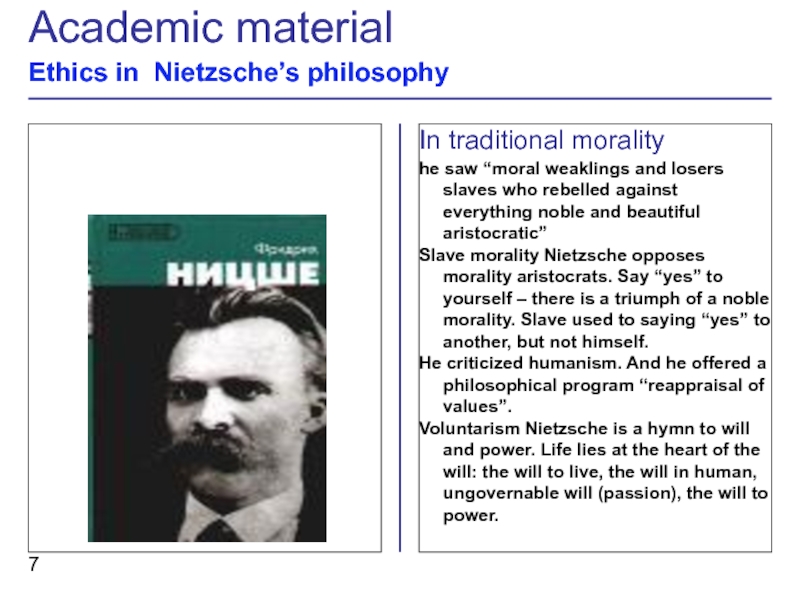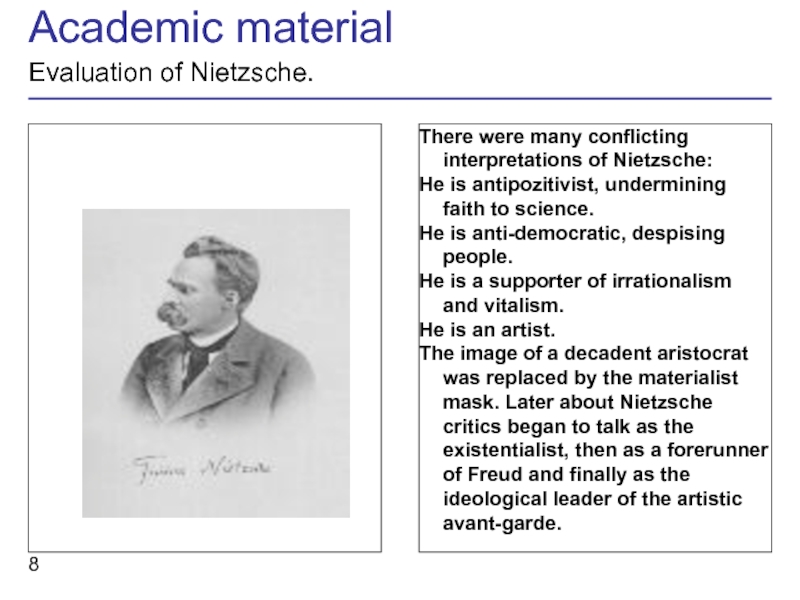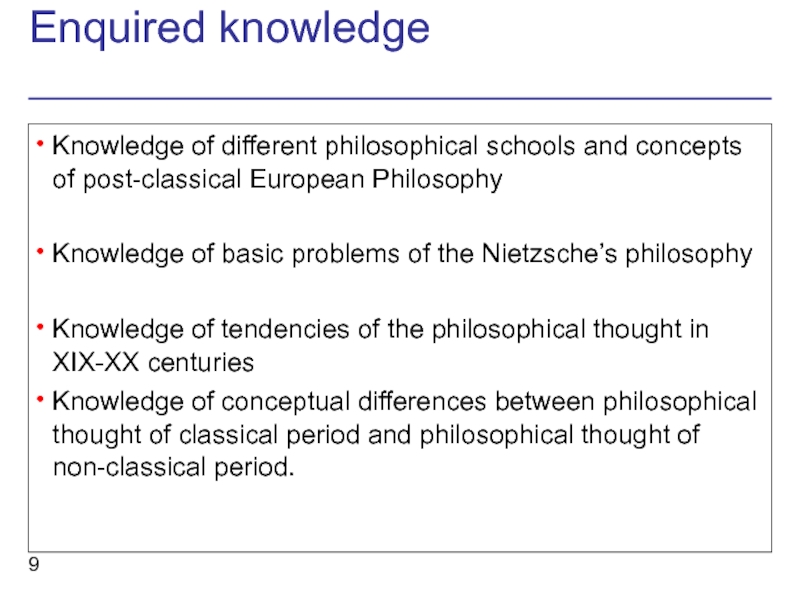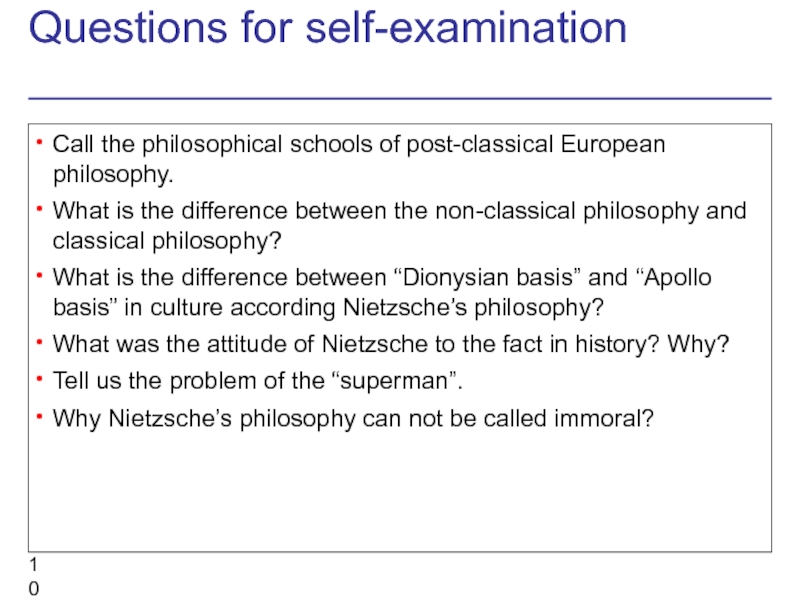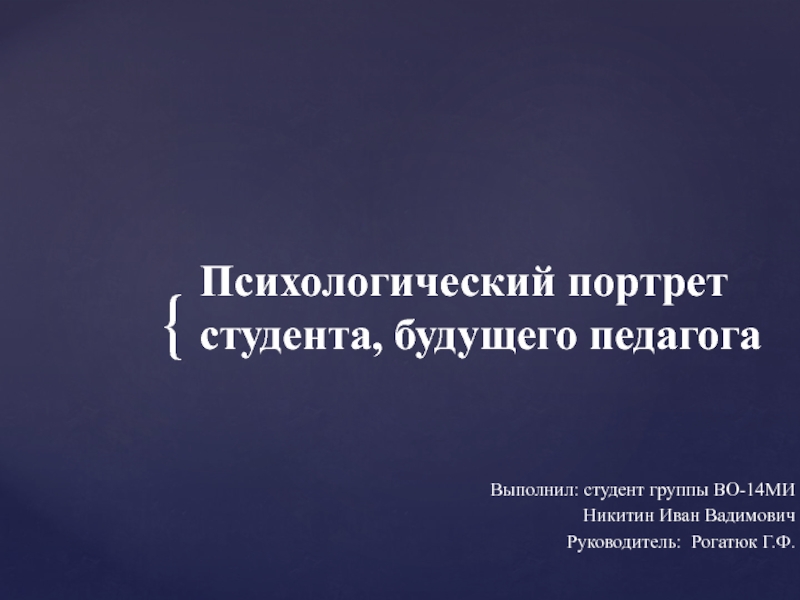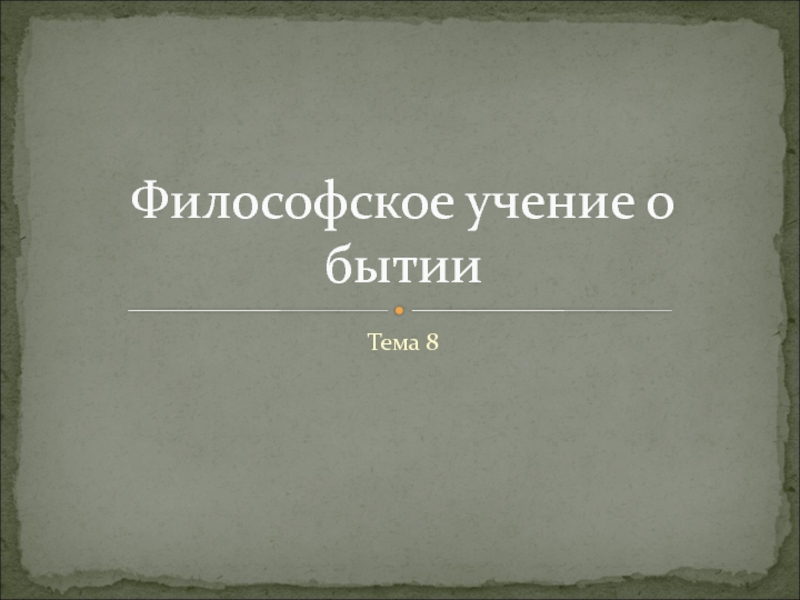- Главная
- Разное
- Дизайн
- Бизнес и предпринимательство
- Аналитика
- Образование
- Развлечения
- Красота и здоровье
- Финансы
- Государство
- Путешествия
- Спорт
- Недвижимость
- Армия
- Графика
- Культурология
- Еда и кулинария
- Лингвистика
- Английский язык
- Астрономия
- Алгебра
- Биология
- География
- Детские презентации
- Информатика
- История
- Литература
- Маркетинг
- Математика
- Медицина
- Менеджмент
- Музыка
- МХК
- Немецкий язык
- ОБЖ
- Обществознание
- Окружающий мир
- Педагогика
- Русский язык
- Технология
- Физика
- Философия
- Химия
- Шаблоны, картинки для презентаций
- Экология
- Экономика
- Юриспруденция
Post-classical European philosophy. Irrationalism презентация
Содержание
- 1. Post-classical European philosophy. Irrationalism
- 2. Lection’s plan Post-classical European philosophy. Period of
- 3. Academic material Period of post-classical philosophy Variety
- 4. Friedrich Nietzsche (1844—1900) and his view at
- 5. Philosophical views He opposes positivism and its
- 6. Academic material Aesthetics in the philosophy of Nietzsche
- 7. Рисунок In traditional morality he saw “moral
- 8. Рисунок There were many conflicting interpretations of
- 9. Enquired knowledge Knowledge of different philosophical schools
- 10. Questions for self-examination Call the philosophical schools
Слайд 2Lection’s plan
Post-classical European philosophy.
Period of non-classical philosophy
1. The variety of schools
2. Irrational concept.
Philosophy of Friedrich Nietzsche
View at the history
Basic philosophical views and works.
Ethics.
Aesthetics.
Evaluation of Nietzsche.
Слайд 3Academic material
Period of post-classical philosophy
Variety of schools and concepts.
Irrationalism
Marxism
Philosophy of life
Positivism
Philosophy of pragmatism
Phenomenology
Hermeneutics
Existentialism
Structuralism
Psychoanalisis
Слайд 4Friedrich Nietzsche (1844—1900) and his view at the history :
Philosopher protests
There are three histories:
Monumental history attempts to find the models in the past to their own satisfaction.
Antique history, for example, attempts to reconstruct the past of his native city as the basis of present time.
Critical history examines past in terms of judges, which are intended to remove obstacles to the realization of their goals.
Irrationalism (latin “Irrationalist” means unwise, unconscious:
Philosophy of Arthur Schopenhauer (1788-1860). His book: «The World as Will and Representation»:
Life is a struggle between compassion (love) and selfishness and malice.
The world is unreasonable. It is run by the evil will.
The world around us is subject to no reasonable forces: will, effects, etc.
Only the will is capable to identifying all things and to influence on it. It is the basic principle of universe.
Academic material
Irrationalism and Nietzsche's view at the history
Слайд 5Philosophical views
He opposes positivism and its belief in the fact. Nietzsche
He confronts Christian morality and creates the idea of the superman. Nietzsche’s philosophy appears as overturning the traditional philosophical and moral values. In the general context of Nietzsche’s thoughts “will to power” does not deny the humanity and it does not justify the “pure race of superman”. Superman is not a Nazi. He is philosopher, heralding the emergence of a new humanity that wants to be “beyond good and evil”.
Academic material
Philosophy of Friedrich Nietzsche
His books.
«Human, all too human» (1878).
In 1882 was published “Funny Science”. Philosopher says about the new destiny of humanity.
1883 – «Thus spoke Zarathustra» , «Beyond good and evil» (1886), «Genealogy of morals» (1887), «Twilight of the idols», «Antichrist», «Ессе homo», «Nietzsche in opposition Wagner» (1888).
In Turin, fascinated by Dostoevsky, he began his latest book “Will to power”, but he did not finish it.
Слайд 7Рисунок
In traditional morality
he saw “moral weaklings and losers slaves who rebelled
Slave morality Nietzsche opposes morality aristocrats. Say “yes” to yourself – there is a triumph of a noble morality. Slave used to saying “yes” to another, but not himself.
He criticized humanism. And he offered a philosophical program “reappraisal of values”.
Voluntarism Nietzsche is a hymn to will and power. Life lies at the heart of the will: the will to live, the will in human, ungovernable will (passion), the will to power.
Academic material
Ethics in Nietzsche’s philosophy
Слайд 8Рисунок
There were many conflicting interpretations of Nietzsche:
He is antipozitivist, undermining
He is anti-democratic, despising people.
He is a supporter of irrationalism and vitalism.
He is an artist.
The image of a decadent aristocrat was replaced by the materialist mask. Later about Nietzsche critics began to talk as the existentialist, then as a forerunner of Freud and finally as the ideological leader of the artistic avant-garde.
Academic material
Evaluation of Nietzsche.
Слайд 9Enquired knowledge
Knowledge of different philosophical schools and concepts of post-classical European
Knowledge of basic problems of the Nietzsche’s philosophy
Knowledge of tendencies of the philosophical thought in XIX-XX centuries
Knowledge of conceptual differences between philosophical thought of classical period and philosophical thought of non-classical period.
Слайд 10Questions for self-examination
Call the philosophical schools of post-classical European philosophy.
What is
What is the difference between “Dionysian basis” and “Apollo basis” in culture according Nietzsche’s philosophy?
What was the attitude of Nietzsche to the fact in history? Why?
Tell us the problem of the “superman”.
Why Nietzsche’s philosophy can not be called immoral?
